Women of the Year: ‘Unstoppable’ Mama D won’t stop feeding homeless because of pandemic

For more than 10 years, Saturdays at Calvary Baptist Church in Spokane meant serving soup for those who needed it. When the coronavirus pandemic forced the church to close the program, Betty “Mama D” Dumas found a way to keep serving food on Saturdays.
Dumas has been making soup at the kitchen since its second week in operation. That Saturday, she came to visit and saw they didn’t have any soup. She appointed herself the soup lady that day and started learning recipes, as her soup-making experience had been limited to opening and heating cans of Campbell’s.
Dumas is “unstoppable” in her effort to help others, said Glenn Vaughn, who volunteers at the kitchen with Dumas.
“She’s just one of those people, you have to put your spiritual sunglasses on or it will blind you because it radiates off her,” Vaughn said. “It is the depth of her commitment. She could be bleeding out and she would be down there every single Saturday.”
After 46 years teaching, Dumas retired from Finch Elementary School in 2015, only to continue volunteering at the school from 8:30 a.m. to 2 p.m. four days a week.
COVID-19 has kept her away from the “little people” she loves, she said, but she found a way to keep feeding the hungry.
Every week since March, she and her son Corey Dumas fix 60 brown- bag meals at their home while another two women make about 100 meals together. One recent menu was homemade potato salad, fried chicken, barbecue sauce, a roll, grapes, Pepsi and a bottle of water.
Dumas said she goes through each bag and writes a little message like “Jesus loves you” to minister through the meals.
Because their makeshift meal program isn’t associated with the church, Dumas and the other volunteers pay for the food out of pocket, Dumas said. Then they take all 160 meals to the Goodwill parking lot near Dick’s Hamburgers.
To prevent a crowd from forming, her son and other volunteers take some bags and head down into downtown Spokane, where they pass meals out to homeless people.
She refers to the people who come to the soup kitchen as “our honored guests,” Vaughn said, and if anybody speaks negatively about those guests, they’ll hear from Dumas, he said.
Dumas said she feels called to help others by Jesus’ words in the Bible: “When I was hungry, you gave me something to eat.” Because, she said, no one can know what Jesus would look like today, “if you refuse that person, you might be refusing Jesus because those are his children.”
“When I ride around this town and I look at people, that’s somebody’s child, somebody’s daddy, somebody’s mother. You put yourself in their shoes and say, ‘Wow.’” Dumas said. “You’ve got to look at it through God’s eyes. You can’t look at it through our natural eyes. You have to look from the heart.”
Her pay as a volunteer is others’ happiness, she said.
Dumas believes she was born spiritual – “It’s in my heart” – but her parents were also dedicated Christians. Dumas’ father was a railroad worker who laid tracks in Georgia, where Dumas grew up under Jim Crow law. He was also a barber and a spiritual man, she said.
Her mother and grandmother taught her the most because they were home, she said. Her mother raised Dumas and her seven siblings and always had more kids at the house, she said. Later, she did housework to bring in money.
Growing up, she shared a bed with her two sisters, washed clothes by hand, walked about a mile to school every day and drank out of the “colored” fountain.
When her family moved from a rural town to Savannah, she said she watched as Black people moved into the cities, white people moved out to the suburbs. Then as Black “doctors and lawyers” moved into the suburbs, white people started moving back to the city.
Dumas moved to Spokane in 1963 for her husband’s work in the military. Right away she started volunteering at her children’s school, Grant Elementary School, doing tasks like correcting papers and filling out paperwork she said.
While her husband was still overseas, she went to school part time and worked part time at Grant. From there, she moved to Finch Elementary School, where she spent the majority of her 46 years as a teacher educating second- and third-graders.
For the past five years, she’s volunteered out of her small office, helping kids who need a little extra attention.
“My pay was knowing that I’m helping kids, and that they are learning and they appreciate my help, they did,” Dumas said. “When I go to the room, they say, ‘Take me! Take me!’ and I’d tell them, ‘Baby, I can’t take you, your teacher has to pick.’ “
She’d save the last few weeks of the year to work with the students who had been asking her to take them all year.
Now, she’s considering if she might be able to pitch in at a day care with enough social distancing measures. She said she follows the governor’s orders and trusts the Lord to protect her from the virus, but if she’s not meant to teach this year, she’ll accept it.
She said in some ways, “things are better today,” but the world is still a “mess” with too much fighting.
“I don’t know if that’s ever going to change before we leave this earth,” Dumas said. “I wish it were better. As long as we have man in this world, it won’t be. Live and let live.”
Her best advice: “Show more empathy and less judgment.”
